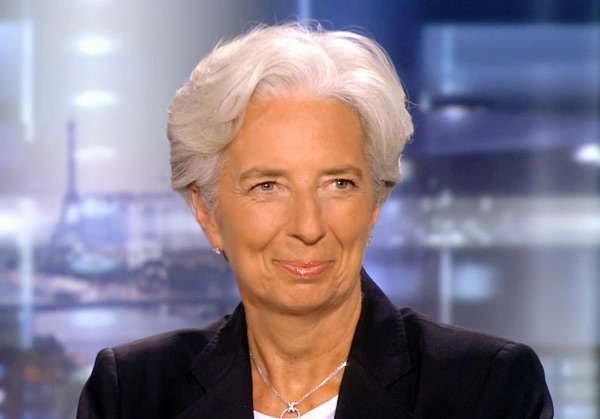Diplomatic and Military Affairs
French Finance Minister Lagarde named IMF chief
Updated: 2011-06-29 04:19
By Chen Weihua (chinadaily.com.cn)
NEW YORK - Despite the widespread call from emerging economies for their candidate to head the International Monetary Fund (IMF), the IMF board announced on Tuesday it will name French Finance Minister Christine Lagarde to the position.
The 24-strong executive board, which represents the 187-nation fund based in Washington, DC, said in an early afternoon statement that Lagarde, the first woman named to the top IMF post since the institution’s inception in 1944, will start her five-year term on July 5.
|
 France's Finance Minister Christine Lagarde, seen in this video grab from private TF1 television prime time news, reacts after the announcement that she was selected as the new IMF chief, at the television studios in Boulogne-Billancourt, near Paris June 28, 2011. [Photo/Agencies] |
The appointment of Lagarde as IMF Managing Director came as little surprise in recent days after she was endorsed by China on Monday. She also received US support early Tuesday, hours before the IMF announcement. Russia and most of the European countries also backed her.
The United States, which chose this time to wait for the rest of the world to make their decisions first, expressed its support early Tuesday in a written statement by Secretary of Treasury Timothy Geithner.
The US holds about 17 percent of the voting rights at IMF, by far the largest compared with any other countries. Europe, as a whole, has 32 percent of the voting block, while Japan and China rank second and third, respectively, in voting rights as a country.
Lagarde’s only contender for the job, Mexico’s central bank governor Agustin Carstens, also former deputy managing director of IMF, had only secured endorsements from Canada, Australia and most of the Latin American countries except for Brazil and Argentina.
Emerging economies, which have contributed most to the global economic growth in the past years, have voiced their outcry for reforming the IMF and the World Bank, which have been respectively led by Europeans and Americans since their inception.
The IMF was turned into turmoil after former Managing Director Dominique Strauss-Kahn resigned on May 18 to face charges of sexually assaulting a hotel maid in New York. He has denied the allegations.
The 55-year-old Lagarde, who led the Chicago-based law firm Baker & McKenzie before entering French politics about six years ago, has earlier dismissed criticism that the debt crisis in Europe will make her ignore the emerging economies.
Sebastian Mallaby, director of the Maurice R. Greenberg Center for Geoeconomic Studies and Paul A. Volcker Senior Fellow for International Economics at the Council on Foreign Relations, had earlier advocated for a candidate from the developing countries.
"I believe it would have been better for the IMF to select a Managing Director from outside Europe. That said, I think Christine Lagarde will do her best to earn the support of emerging economies by listening to their concerns and increasing their voice within the Fund," Mallaby told China Daily.
Edwin Truman, senior fellow at Peterson Institute for International Economics, told China Daily that he is sure that Lagarde will try to address the concerns of emerging market economies.
Truman, the former assistant secretary of the US Treasury for International Affairs from 1998 to 2001, still believes that Carstens is probably the best qualified candidate from an emerging market that is likely to be put forward for at least the next 10 years.
"Lagarde has made lots of promises to gain support from developing and emerging nations, so I think she will be sensitive to their needs,” said Dani Rodrik, professor of international political economy at Harvard Kennedy School.
But Rodrik still insisted it was high time in his view for the position to go to someone from the developing world.
Steven Dunaway, adjunct senior fellow for international economics at Council on Foreign Relations and former deputy director of the Asia and Pacific Department at IMF, told China Daily that Lagarde will face three major challenges by becoming the IMF chief.
"One, she has to establish her independence from the European leaders who put her in the job. She has to show that the IMF will not simply be a convenient source of funding to help Europe finance the efforts to deal with its debt crisis and that she will cut off IMF lending if European countries fail to consistently meet the conditions in their loan programs," Dunaway said.
"Two, Lagarde needs to enhance the legitimacy of the IMF by giving emerging market countries increased voting shares and greater representation on the institution’s executive board commensurate with these countries' growing importance in the world economy. In acquiescing to Lagarde's appointment, emerging market countries are likely to be expecting a quick resolution to this issue.
"Three, Lagarde has to demonstrate that she can effectively manage the work of the IMF, especially given her limited formal training in economics. The hope is that Lagarde will be able to master these challenges," Dunaway said.
Mallaby, from the Council on Foreign Relations and author of the recent book “More Money Than God” which has been translated into Chinese, said Lagarde's priority is clearly the euro crisis.
"The IMF needs to help Europe rethink its approach to the euro crisis; and in particular it must be willing to impose haircuts on private creditors," he said.
Rodrik of Harvard Kennedy School also agreed that the crisis in the euro zone is the most immediate priority as it threatens not only Europe, but also global financial stability.
"Beyond that, we need a new framework for global financial flows and regulation, and she needs to do a lot of hard thinking on that. We certainly cannot keep going with a major financial crisis every decade or so," Rodrik said.
Truman of Peterson Institute believes that one of the many priorities for Lagarde is IMF’s governance where Europe has too many votes and too many voices.
Allan Meltzer, professor of political economy at Carnegie Mellon University’s Tepper School of Business, also expressed his concern.
"Christine Lagarde has been an able finance minister in the French government. However, I do not think a European should head the IMF at this time. The IMF should avoid further entanglement in ECB (European Central Bank) problems… Putting more money from China, Japan, the US and others is a waste because more debt will not prevent ultimate default by Greece," Meltzer said.
While some experts have argued for a reduced function for IMF, Truman believes the IMF has proved its worth time and again over the past 40 years.
"There is no alternative to the IMF at the present. We just need to make it work better," said Rodrik.
However, Meltzer of Carnegie Mellon believes IMF should indeed do less.
"When I chaired a Congressional commission known as the Meltzer Commission in 2000, we urged the IMF to distinguish between problems countries faced as innocent third parties and problems that countries created for themselves by choosing inappropriate policies. The IMF should help the first group, not the second. Greece's problems were created by Greek politicians," he said.
"Instead of lending money to Greece, the Europeans should allow a default and use their loans to prevent bank failures," said Meltzer.
E-paper

Franchise heat
Foreign companies see huge opportunities for business
Stitched up for success
The king's speech
Tough sail
Specials

Premier Wen's European Visit
Premier Wen visits Hungary, Britain and Germany June 24-28.

My China story
Foreign readers are invited to share your China stories.

Singing up a revolution
Welshman makes a good living with songs that recall the fervor of China's New Beginning.





